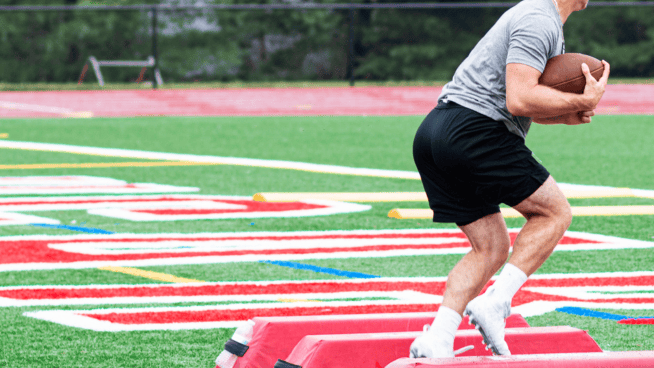Three Don'ts of Mental Toughness
The margin between winning and losing is so slim that teams and players must find small ways to maximize their play. Often, this comes through learning what to avoid or stop doing. Here are three “don’ts” of mental toughness.
Don’t Multi-Practice
During games, when the pressure mounts, your focus should be on the task at hand. If you practice with your iPod or cell phone handy, you can easily become distracted. You will rarely, if ever, witness high-caliber marathoners, triathletes or swimmers listening to music while training. They devote their full attention to their sport.
If your commitment is to get better, you need to stow away your cell phone and iPod while you practice or work out. Multi-practicing is like multi-tasking—you may think it doesn’t affect you, but you are not giving 100 percent of your attention to the task at hand. If you want to be focused during games, practice focusing during training to form the habit and build your confidence.
Avoid the Light Switch
The “light switch” is thinking you can turn it on when you want—and that “it” will be there on game day. This mindset is of little consequence when you play well, but its negative effects are obvious when you or your team are out of contention or playing poorly. Light switch players quit either physically or mentally, saying it’s because a practice or game doesn’t really matter. They give up on it. Mental toughness means avoiding the “light switch” mentality by never giving up and consistently reinforcing quality practice and play regardless of the score.
No Expectations
Have you ever been sick, had a major setback or distraction outside of sports and actually ended up playing great? Since you thought there was no way you could play well, it took all of your strength just to keep playing. Having no expectations forced you to focus on aspects within your control. You got out of your own way.
Tiger Woods used to say, “I expect to win every tournament.” What he actually meant was that he had the confidence to win every tournament. The difference between expectations and confidence is the results; expecting certain results like a score, or even winning, is out of your control. Have confidence in what you can control, like committing to shots, letting go of mistakes and playing aggressively.
Photo: cbc.ca
Dr. Rob Bell is the owner of Dr. Rob Bell, LLC in Indianapolis, helping athletes, coaches, teams and parents build mental toughness. He is a certified sport psychology consultant with The Association of Applied Sport Psychology. He also works as a caddy on professional golf tours. His first book, Mental Toughness Training for Golf, was published in 2010. A prolific writer, Dr. Bell has been published in the Journal of Applied Sport Psychology, Journal of Athletic Insight, Journal of Sport Behavior and Encyclopedia of Sports. He writes extensively on the mental game—for, among others, Runner’s World, The New York Times and STACK magazine—and he has been a presenter for numerous teams, schools and organizations. Dr. Bell earned his B.A. in psychology from Shepherd University; his M.Ed. in kinesiology, with a specialty in sport psychology, from Temple University; and his Ph.D. in sport psychology from the University of Tennessee.
RECOMMENDED FOR YOU
MOST POPULAR
Three Don'ts of Mental Toughness
The margin between winning and losing is so slim that teams and players must find small ways to maximize their play. Often, this comes through learning what to avoid or stop doing. Here are three “don’ts” of mental toughness.
Don’t Multi-Practice
During games, when the pressure mounts, your focus should be on the task at hand. If you practice with your iPod or cell phone handy, you can easily become distracted. You will rarely, if ever, witness high-caliber marathoners, triathletes or swimmers listening to music while training. They devote their full attention to their sport.
If your commitment is to get better, you need to stow away your cell phone and iPod while you practice or work out. Multi-practicing is like multi-tasking—you may think it doesn’t affect you, but you are not giving 100 percent of your attention to the task at hand. If you want to be focused during games, practice focusing during training to form the habit and build your confidence.
Avoid the Light Switch
The “light switch” is thinking you can turn it on when you want—and that “it” will be there on game day. This mindset is of little consequence when you play well, but its negative effects are obvious when you or your team are out of contention or playing poorly. Light switch players quit either physically or mentally, saying it’s because a practice or game doesn’t really matter. They give up on it. Mental toughness means avoiding the “light switch” mentality by never giving up and consistently reinforcing quality practice and play regardless of the score.
No Expectations
Have you ever been sick, had a major setback or distraction outside of sports and actually ended up playing great? Since you thought there was no way you could play well, it took all of your strength just to keep playing. Having no expectations forced you to focus on aspects within your control. You got out of your own way.
Tiger Woods used to say, “I expect to win every tournament.” What he actually meant was that he had the confidence to win every tournament. The difference between expectations and confidence is the results; expecting certain results like a score, or even winning, is out of your control. Have confidence in what you can control, like committing to shots, letting go of mistakes and playing aggressively.
Photo: cbc.ca
Dr. Rob Bell is the owner of Dr. Rob Bell, LLC in Indianapolis, helping athletes, coaches, teams and parents build mental toughness. He is a certified sport psychology consultant with The Association of Applied Sport Psychology. He also works as a caddy on professional golf tours. His first book, Mental Toughness Training for Golf, was published in 2010. A prolific writer, Dr. Bell has been published in the Journal of Applied Sport Psychology, Journal of Athletic Insight, Journal of Sport Behavior and Encyclopedia of Sports. He writes extensively on the mental game—for, among others, Runner’s World, The New York Times and STACK magazine—and he has been a presenter for numerous teams, schools and organizations. Dr. Bell earned his B.A. in psychology from Shepherd University; his M.Ed. in kinesiology, with a specialty in sport psychology, from Temple University; and his Ph.D. in sport psychology from the University of Tennessee.











